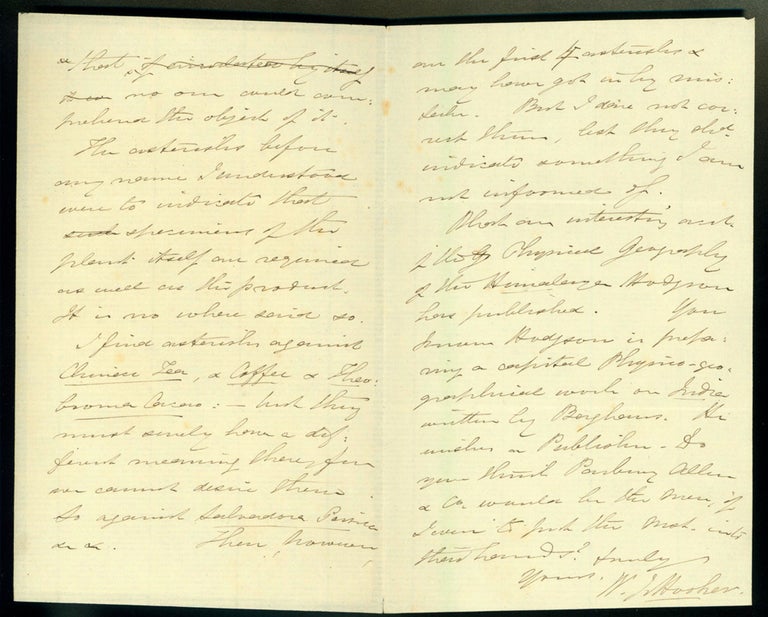
Autograph letter signed to an unidentified correspondent
Publisher Information: London.
Hooker, William Jackson (1785-1865). Autograph letter signed to an unidentified correspondent. [London,] Royal Gardens, Kew, April 3, n.d. (probably 1857 or after). 3pp. 179 x 112 mm. Fine apart from a little faint spotting.
Hooker, the first full-time director of the Royal Botanic Gardens at Kew, devoted himself to the study of botany from an early age, specializing in mosses, liverworts and other cryptogamia. He served as regius professor of botany at the University of Glasgow from 1820 to 1841, when he was appointed to head Kew Gardens. Under Hooker's leadership Kew grew from eleven acres to its present size of nearly 300 acres, and its collections vastly increased, largely due to a network of Hooker's former students who brought in specimens from around the world. Hooker's own herbarium, which contained some 4000 volumes and one million dried plant specimens, was purchased by the British government for the nation after Hooker's death. Hooker was the author of over two dozen works on botany, including British Jungermanniae (1816), which established hepaticology (the study of liverworts) as a separate field; he also edited several botanical journals.
The first part of Hooker's letter deals with the preparation of a forthcoming botanical publication, most likely The Museum of Economic Botany, or a Popular Guide to the Useful and Remarkable Vegetable Products in the Two Museum Buildings of the Royal Gardens of Kew (1858):
"I have received & read & made 2 or 3 verbal corrections & transmitted as you desired to Mr. Wyatt (I presume at the Palace of Westminster) our Cat[alogue]. Having been unavoidably absent of late I know not what has been done by our Committee. If the present Catalogue is circulated by itself I think it requires a heading or title for not one word appears of the use & object of it: so that no one could comprehend the object of it. The asterisks before any name I understood were to indicate that specimens of the plant itself are required as well as the product. . . . I find asterisks against Chinese Tea, & Coffee & Theobroma Cacao:--but they must surely have a different meaning there, for one cannot desire them so against Salvadora Persica [the "toothbrush tree"] &c. &c. . . ."
The next part of Hooker's letter touches on the work of Brian Houghton Hodgson (1800-1894), a naturalist and one of the pioneers of scientific ethnology. Hodgson spent much of his life in India, where he discovered 39 species of mammals and 124 species of birds that had hitherto been undescribed. He was the author of numerous books and papers, including Papers Relative to the Colonization, Commerce, Physical Geography, &c., &c. of the Himalaya Mountains and Nepal, published in Calcutta in 1857. He was a close friend of Hooker's son, the naturalist Joseph Dalton Hooker (1817-1911).
"What an interesting acct. of the Physical Geography of the Himalayas Hodgson has published. You know Hodgson is preparing a capital Physico-geographical work on India written by Bagham[?]. He wishes a publisher. Do you think […] Allen & Co. would be the men if I were to put the mst. into their hands?"
"Allen & Co." most likely refers to the publisher W. H. Allen & Co., which issued a large number of books relating to India in the 1850s.
Book Id: 40458Price: $1,750.00
